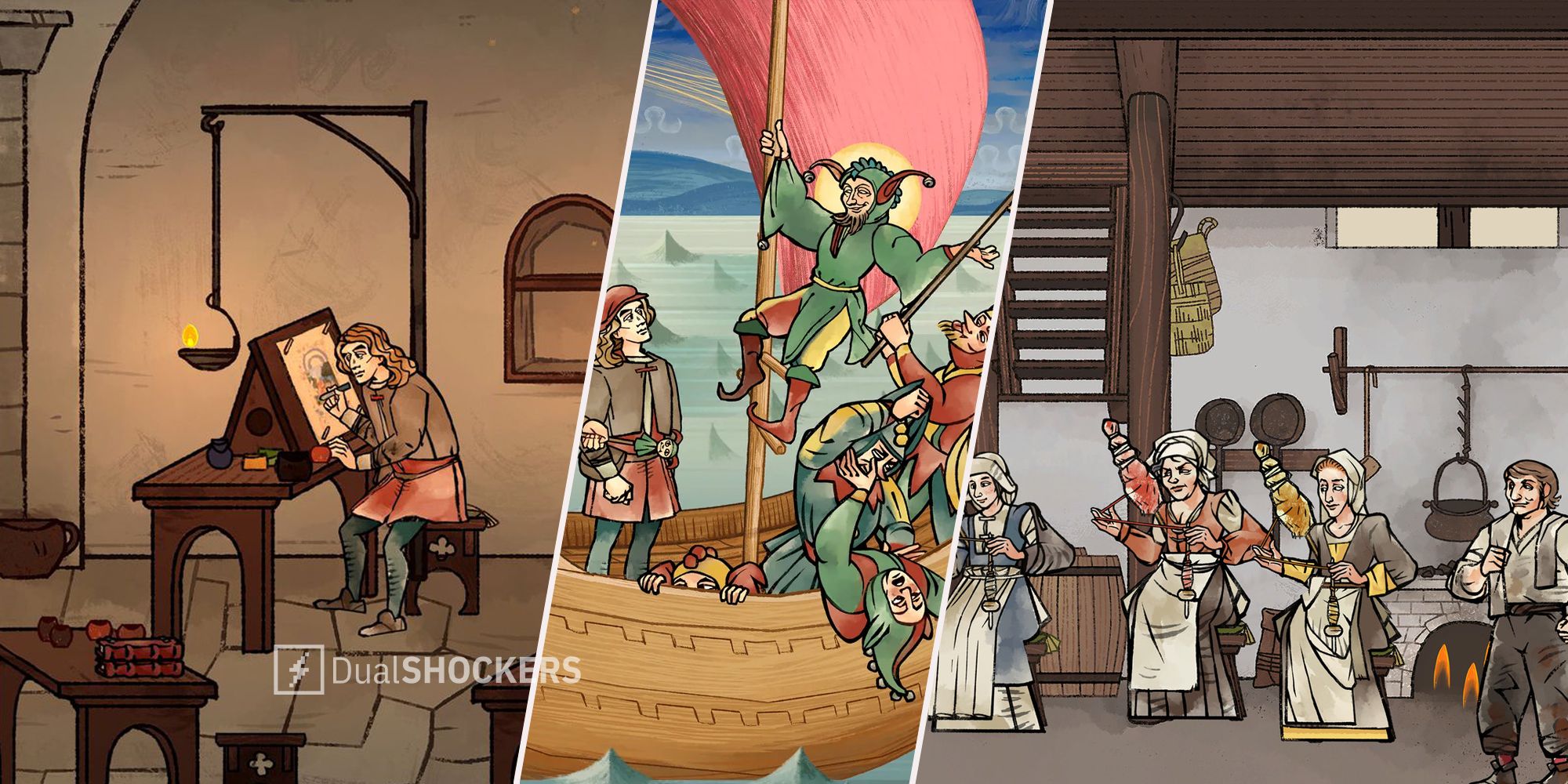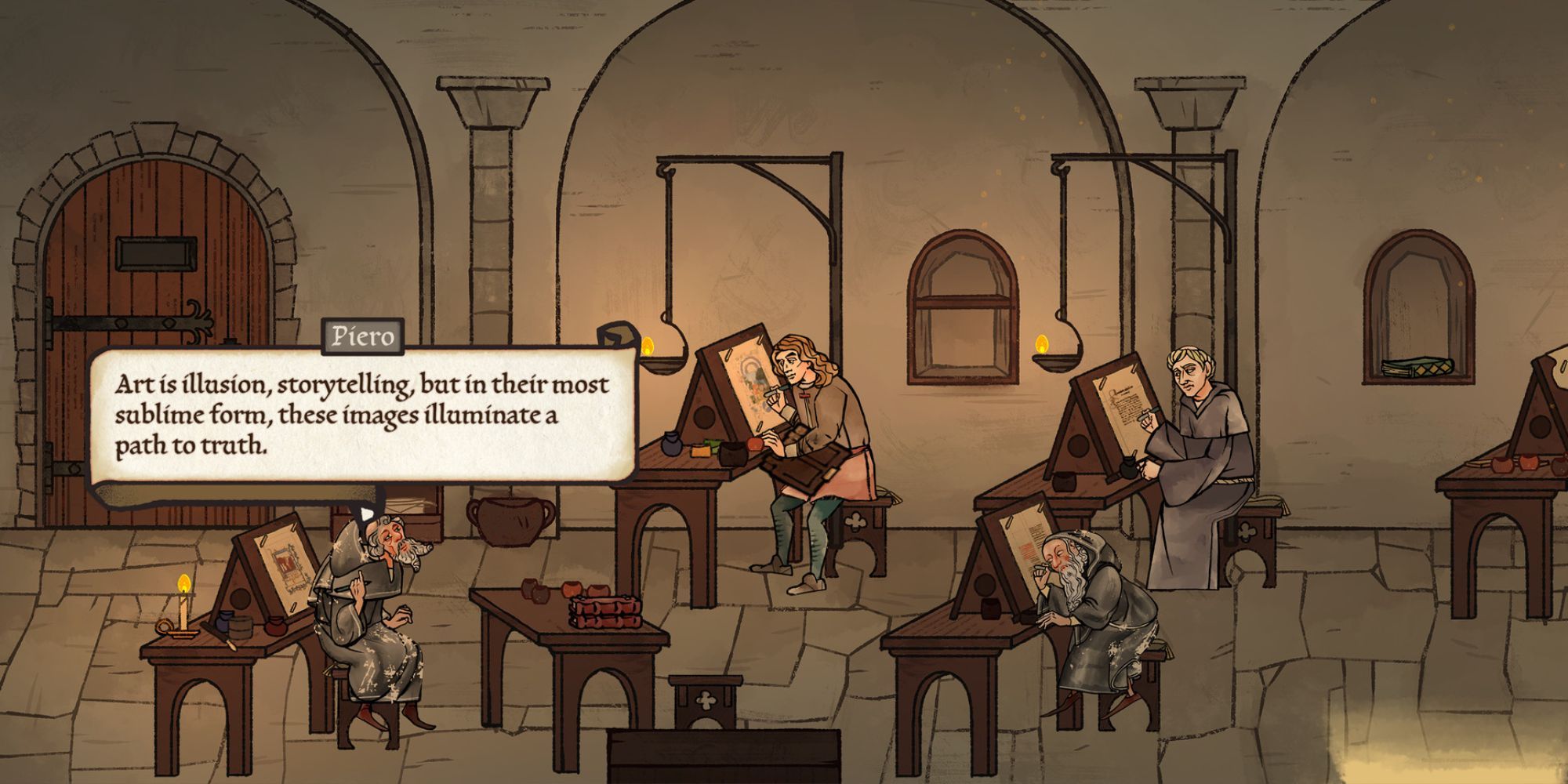ASMR (or Autonomous Sensory Meridian Response, as pretty much no one calls it) is a strange old thing–a tingling sensation on the skin accompanied by general feelings of relaxation and wellbeing. It can occur from a number of different triggers, but the one that’s really taken the internet by storm in the last decade is the auditory one, brought on by gentle sounds like pages turning in a book, getting your ears inspected by that ear-o-scope that doctors have, or a soft, gentle voice usually talking to you about mundane things.
I don’t think I’m that far along on the ASMR spectrum, but I do like my relaxing rain sounds at night, and there are certain types of voices that instantly make my eyelids go heavy (I still blame my poor A-Level results in Law on the fact that my teacher had this drowse-inducing voice that totally derailed my focus, consigning me to a career in games journalism). Playing Obsidian’s medieval-manuscripty murdery mystery Pentiment, I get washed over with those same feelings of utter relaxation, and that’s largely thanks to its beautiful soundscape.
First of all, there is no voice acting in Pentiment. There’s plenty of dialogue, but all of it is expressed through handwritten scrawlings that are true to the style of the time (except written in modern English, of course). The text doesn’t just pop up on your screen, and instead you see and hear it being written out before you, in a font that reflects the education and background of the person you’re speaking to you. An NPC’s font style can even change to a more eloquent one when you discover that they’re actually university-educated, for example.
The sound of the pen on paper as the writing manifests before you hits all those ASMR notes–scratchy, sparse, and gentle. It lulls you into the leisurely pace of the game, and if you listen carefully you’ll hear that the scrawlings also reflects the tone of voice a particular character is taking on with you. An abbott angry at your prying into church matters will write in terse, hard strokes, while everyday ‘good mornings’ from the townsfolk sound carefree and breezy.
Whatever the context, those scrawlings set a wonderful tone for the game, and even though I could speed dialogue up pressing a button to auto-fill it, it sounds so dreamy that I found myself not wanting to. Pentiment has become as much a meditative experience to me as it is a rich historical document and murder mystery game, so why would I rush it?
The scrawly foreground chatter is supported by a deep background ambience. In the town itself, the distant plinking of a blacksmith’s hammer is just about audible beneath the gentle faunal orchestra of sheep, chirping birds, and the occasional barks of a dog. You could almost miss the smooth, constant sound of the river underlying the entire soundscape. The fact that there are rainstorms on a couple of the days in Pentiment almost feels like a nod to all those apps, Alexa skills, and YouTube videos of white noise and ‘rain on tent’ or ‘rain on tin roof’ sounds.
For a quieter, more meditative vibe, head up to Kiersau Abbey, where the thick stone walls of the buildings block out the outside world and cause the sparse sounds of the interior to reverberate. Naturally, the monks and nuns residing there aren’t the most talkative types (not that you’d hear them anyway), so you’re left with the sounds of creaking roof beams, crackling fires, and your own feet gently tapping the stone as you traverse its halls.
The abbey’s Scriptorium is its own kind of acoustic paradise, with the simultaneous scribblings of the manuscript writers overlapping each other in a scritchy-scratchy soundscape that makes my ears tingle and my eyelids drop. It’s lovely and more than a little bit hypnotic. Even as an atheist, I can almost see the appeal of monking around in a medieval abbey; your daily routine is sorted, you eternal life is sorted (or so you think), and you don’t need to make polite chit-chat while you feast on what looks like pretty good grub.
My atheist faith (or lack thereof) was already tested by the general ambience of the abbey, but it was pushed to its absolute brink when I walked in on a particular monk, Brother Rudeger, doing some Gregorian chanting in the church. It completely caught me by surprise, and was one of the few times in my game (so far) that I heard a character with an actual human voice. I must have stayed in there for a good five minutes in a state of complete serenity; it was a magical moment imbued with a sense of peace and solitude even as the plot began to pivot towards darkness and intrigue.
Of course, Pentiment’s gentle soundscape is befitting of a game that–despite revolving around a grisly murder and having a sort-of time limit–is presented and paced to soothe the soul while immersing you in a well-observed slice of medieval rural Bavaria. Like a nature documentary voiced by David Attenborough, Pentiment hits all the right notes for a deeply relaxing experience.



